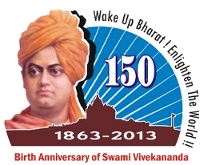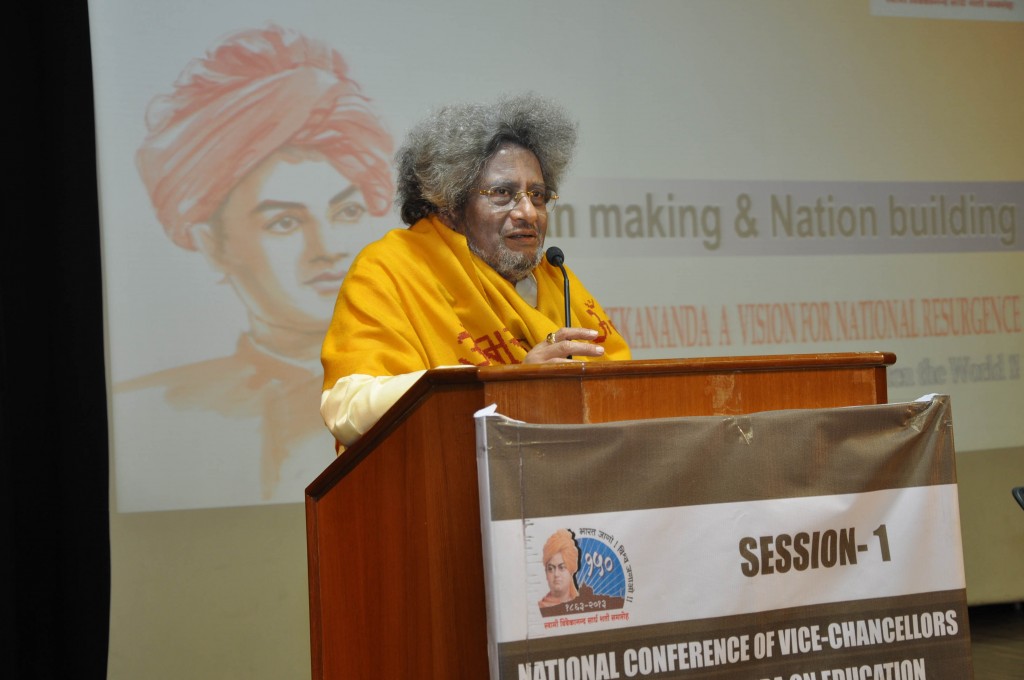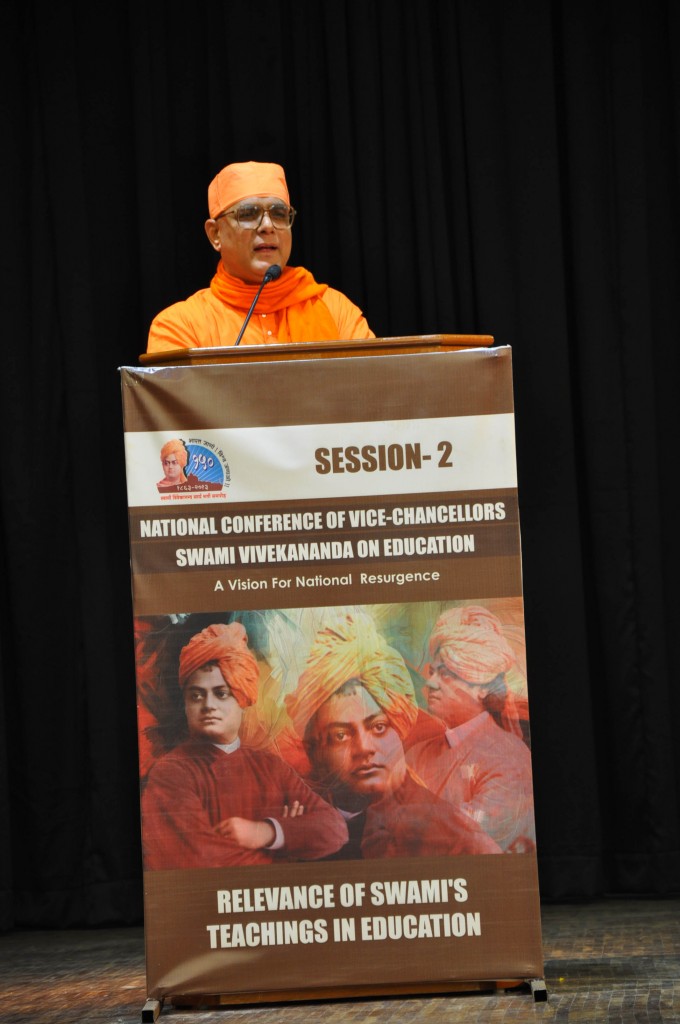A total of 237 delegates representing 125 Universities of 23 states attended the two day conference.
 New Delhi: To commemorate the 150th birth anniversary of Swami Vivekananda Swami Vivekananda Sardh Shati Samaroh Samiti’ organised a unique two-day National Conference of Vice Chancellors on ‘Swami Vivekananda on Education-Vision for National Resurgence’ from November 16 to 17 in New Delhi. The two-day conference was attended by Vice- Chancellors, Chancellors and Directors of Central, State, deemed and private universities and various renowned educationists from all over the country. The motive of the conference was to discuss the ways of implementing Swamiji’s vision for education.
New Delhi: To commemorate the 150th birth anniversary of Swami Vivekananda Swami Vivekananda Sardh Shati Samaroh Samiti’ organised a unique two-day National Conference of Vice Chancellors on ‘Swami Vivekananda on Education-Vision for National Resurgence’ from November 16 to 17 in New Delhi. The two-day conference was attended by Vice- Chancellors, Chancellors and Directors of Central, State, deemed and private universities and various renowned educationists from all over the country. The motive of the conference was to discuss the ways of implementing Swamiji’s vision for education.

HRD Minister Dr. Pallam Raju inaugurating the conference by lighting the lamp. Seen from left Shri. R. S. Gupta (Former Police Commissioner, Delhi), Prof. Aniruddha Dehpande (National Secretary, SVSSSS), Dr. Subhash Kashyap (Former Secretary General, Lok Sabha) & Dr. Anil Karodkar (Former Chairman, Atomic Energy Commission)
At the inaugural session, Shri Anil Kakodkar (former Chairman of Atomic Energy Commission) shared his experience and said in our education system something is seriously wrong, we are still suffering from a sense of inferiority. He said Swamiji’s teachings of inculcating self-confidence in people are more relevant today. He further added that India needs to make path-breaking inventions in various fields.
Chief Guest Dr MM Pallam Raju (Union HRD Minister) said Swami Vivekananda called it a sin to neglect the upliftment and education of masses; he also stressed on learning Sanskrit by all the people in the country.

HRD Minister Pallam Raju speaks
Former Secretary General of Lok Sabha and Hon. Chairman of the SVSSSS Dr Subhash Kashyap said unfortunately today man has been reduced to the level of a mere commodity and is evaluated in terms of GDP and GNP only. This degradation is against the teachings of Swamiji who considered the aim of education to be man making. Quoting Swami Vivekananda he further said that like European renaissance came after 100 enlightened individuals, similarly Swamiji felt that 100 enlightened souls can rebuild India.
The inaugural function was followed by various sessions on different themes. In the session on ‘Man Making and National Resurgence’ guest speaker Dr Pranav Pandya (Chancellor of Dev Sanskriti Vishwavidyalaya, Haridwar) said it’s said no notable scientific inventions are being done in our country. He said Swamiji always reprimanded those who adhered to meaningless rituals and wanted to open a Vedic University with the help of Jamshedji Tata. Dr Pandya said the times is changing rapidly and the vision of Swami Vivekananda of national resurgence must be realised by all of us. The chairman of the session Prof Thimme Gowda (VC Bangalore university) said his University is planning to add Swamiji’s teachings in the curriculum of graduate and undergraduate courses.
In the second session, the guest speaker Ku. Nivedita Bhide (vice president, Vivekananda Kendra, Kanyakumari) spoke on the topic ‘Purpose of Life and Character Building’ and presented Swamiji’s ideology on this. The session was presided over by Shri Sachidanand Joshi (VC of Kushabhau Thakre Patrakarita Vishwavidyalaya, Raipur). VCs and educationists from various universities also presented their views in the session and discussed how teachers can contribute in it. Shri Joshi said that teachers must follow the example of high and noble character Swami Vivekananda.
In the following session on ‘Relevance of Swamiji’s Teachings in Education’ Swamiji Atmapriyananda (Chancellor of Swami Vivekananda Ramkrishna University, Kolkata) quoting extensively from various religious texts presented Indian and Swamiji’s vision of education. He said knowledge is of no use if it cannot help us in handling currents and cross currents of life. Chairman of the session Prof. Harshadbhai Shah (VC of Children’s University, Gandhinagar) said Swamiji wanted an education that can build man of character and strength.
The session on ‘Content and Research’ was presided by Dr Meena Chandawarkar (VC, Karnataka State Women’s University, Bijapur) and the guest speaker was Dr Venkat Rangan (VC, Amrita University Coimbatore). Dr Rangan told how the students of his University do social services like cleaning of public places so that they can get an idea of the adverse effects of modernisation. Dr Meena Chandawarkar said change IT from Information Technology to India’s Tomorrow. Various other lectures on different themes were also conducted. Lecture on the theme ‘Universal Brotherhood’ was delivered by Dr AK Singh (Director, School of Translation Studies and Training, IGNOU), lecture on ‘Personality Development’ was delivered by Dr MK Shridhar (Director and Dean of Canara Bank Management School, Bengaluru). Smt. Leena Mehendale (CIC, Goa) spoke on ‘Women Education’ and Dr Joram Begi (Director, Higher and Technical Education, Arunachal Pradesh) spoke on ‘Education for Underprivileged’.
Speech by Dr. Pranav Pandya (Chancellor, Dev Sanskriti Vishwavidyalay, Haridwar) on “Man making & National Resurgence”
On November 17, a special lecture on ‘Science and Spirituality’ was organised. Dr Vijay Bhatkar (Chairman of Board of Directors, IIT Delhi) delivered the lecture. He spoke on various aspects of how science, especially computers, is in the tune with the spirituality. He said Indian vision has never separated science from spirituality. Chairman of the function Dr DP Lokwani (VC, MP Medical University, Jabalpur) said Swamiji was the only person in recent history who was spiritually scientific and scientifically spiritual.
A session on ‘Presentation of Experiments’ was organised, in which educationists presented various practical experiments, which they have conducted to realise Swamiji’s vision in education. Dr B Ramamoorthy (Principal of Vivekananda College, Tiruvedkam) told that his whole college has been built on the lines of ancient gurukulas in which Yoga and spiritual studies are an integral part. Shri Sunil Ambekar (National Org. Sec. of ABVP) told about ‘Think India’ campaign and the‘Anubhooti’ programme in which groups of students are taken for a few days to any NGO where they work along with the NGO for social change. Dr Boota Singh Siddhhoo (Dean, PTU) said inspired by the ideals of Swamiji, PTU has stated a complete programme on value education. Dr Kamlesh Mishra (VC Auro University, Surat) said his University is built on the ideals of Sri Aurobindo; they teach only one subject a day and more than classroom lectures, importance is given to practical learning. Chariman of the session Dr Vishwanathan (Chancellor, VIT, Vellore) said our education system has not changed from the times of British. The affiliation system that Britishers started exists only in India, Pakistan and Bangladesh in all over the world, and that it must be ended as soon as possible.
Speech by Swami Atmapriyananda (Chancellor, Ramakrishna Mission Vivekananda University) on “Relevance of Swamiji’s Teachings in Education”
In the session on ‘Application of Swamiji’s Teachings in Present Education System’, Guest Speaker Dr Rajneesh Arora (VC, PTU) argued for giving more autonomy to universities and ending the Government control on it. He said the education system introduced by Macaulay is producing only servants for MNCs. In his speech, Chairman of the session, Dr Yogesh Sinha (VC, MS University, Vadodara) made a passionate appeal to help in making contributions in new scientific inventions and discoveries.
On the session on ‘Role of teacher and Spirit of Inquiry’, Dr Brij Kishore Kuthiyala (VC, Makhanlal Chaturvedi Rashtriya Patrakarita Vishwavidyalaya, Bhopal) made a presentation on how the teacher must play the role of the ‘facilitator’ to the student. He said Swamiji believed humans to be spiritual beings and not just ‘Tabula Rasa’ as was considered by West. Chairman Dr. SK Pandey (VC, Ravishankar Shukla University, Raipur) said our whole education system has become ‘marks oriented’ and is dependent on ‘coaching institutes’, this situation needs to be changed. VCs and educationists also presented their views on the topic.
Former Chief Justice Punjab & Haryana High Court Justice Rama Jois giving valedictory speech
In the session on ‘Bharatiya Languages’ Dr. Kapil Kapoor (Former Pro VC of JNU) said we must give utmost importance to the studies of Indian languages. He said we must take the example of Swami Vivekananda who used English only as tool to spread India’s knowledge. The session was presided over by Shri Laxmi Narayan Jhunjhunwala (Vice President of Ramakishna Mission).
Open Session on Action Plan was conducted in Ramakrishna Math. In this session all the delegates presented their views on what action plan should be made in order to implement the conclusions and outcomes of the Conference. The views that came prominently were that teaching Sanskrit and ancient Indian philosophies must be made mandatory along with Western ones; and that a networking system must be made so that all the delegates present here can be in touch with each other after this conference.
Prof Kuthiyala read out the message sent by Dr APJ Abdul Kalam (former President of India) in which he termed the conference as the ‘Parliament of Educationists’ and said that nation building with moral leadership is a mission for VCs. He said entrepreneurship and the spirit of taking calculated risk for greater gains must be inculcated in the youth. Dr Kalam’s message was full of optimism and said, “When people think big, nation becomes great”.
The Chief Guest of the function, Justice (Retd.) Rama Jois, elaborated the Indian perspective of Dharma, law, etc. and explained how mistranslation of ‘secularism’ to dharmanirapekshatahas created many problems. He said it’s the misfortune of the country that politicians motivated by vote bank politics are trying to put political supremacy over constitutional supremacy. Justice Jois further said that in India there hasn’t been one rule , one religion, one language but still we are one nation due to our culture; Bharat is Mrityunjaya provided we don’t stop our efforts.
Dr Subhash Kashyap and Prof Aniruddha Deshpande also shared the dais. Dr Kashyap said that Swamiji was a worshipper of ‘Durga’ hence he always stressed on building the strength of the nation.
More than 200 delegates participated and shared their personal views and experiences in the various proceedings of the two day conference, which made this unique function a successful experiment. This conference of leaders in higher education was first of its kind organised by any non-governmental agency.
(Aniruddh Subhedar)
Full text of the Consensus Statement
In National Conference of the Vice-Chancellors held on November 16-17, 2013 at New Delhi as part of the world-wide celebrations to mark the 150th Birth Anniversary of Swami Vivekananda Chancellors, Vice-Chancellors and Educationists from 125 Universities have gathered together to deliberate on the practical applications of the seminal teachings of Swami Vivekananda so as to imbue our students and teachers with a spiritual quest, national will and universal outlook and thus to rejuvenate education, especially higher education, in India.
After deliberating for two days on the different aspects of this subject, the Chancellors, Vice-Chancellors and Educationists present here have come to the conclusion that the following aspects of Swami Vivekananda’s teachings are especially relevant in the present condition of education in India: One, education is the manifestation of Perfection already in Man.
Two, in order to manifest that perfection, it is necessary to help the students develop holistically in both the spiritual and physical dimensions and to imbue them with a keen spirit of enquiry.
Three, no one can achieve such manifestation of the divine for merely selfish ends. It is essential to imbue the students with a sense of commitment and responsibility towards the society and nation. Swamiji was insistent that the education of those who do not apply it for ameliorating the condition of their fellow countrymen is a waste.
Four, perfection encompasses all. Those who look towards such perfection, naturally acquire a deep sense of universal brotherhood.
Five, the perfection within finds the most natural expression in the mother tongue. A student imbued with a universal outlook shall respect all languages of the world and may learn several languages. But his education is founded in the mother tongue. Along with the mother tongue, it is essential to learn sanskrit, because sanskrit is the repository of the valueless treasure of the accumulated knowledge of Indian civilisation.
Six, Swamiji lays special emphasis on the education of women; he repeatedly asserts that educated women shall find their own ways rejuvenating education.
In the light of the above teachings of Swami Vivekananda, the Chancellors, Vice-Chancellors and Educationists assembled here resolve to endeavour along the following lines in our various universities and institutions:
Curricular Activities
1. Moulding the ambience and atmosphere of our universities and institutions in accordance with the teachings of Swami Vivekananda. This may involve acquiring writings of and about Swamiji and other foundational literature of Indian civilisation for our libraries; holding of lectures, seminars, etc. and arranging special classes on these issues.
2. Inclusion of Swamiji’s teaching in particular and Indian ideas and thoughts in general in the syllabi of different subjects.
3. Including such project work in the syllabi of different subjects that may encourage the students to interact with the people and communities in their neighbourhood and learn about and from them.
4. Developing new courses at the Certificate, Diploma, Degree and higher levels on the teachings of Swamiji in particular and Indian thought and ideas in general.
5. Encouraging research on different aspects of Indian Civilisations in general and on the life and teachings of Swamiji in particular. Setting up new Centres and institutins dedicated Chairs for this purpose. Setting up dedicated Universities and Institutions for teaching and research in Indian culture and languages.
6. Encouraging teaching and development of textbooks in Indian Languages at all levels.
7. Devising special incentives for Women in Education and reviewing syllabi to ensure that these inculcate respect for women.
8. Setting up facilities for training in Yoga and physical education in our campuses.
Co-Curricular Activities
9. Introducing co-curricular project work concerning Swamiji and other great personages of India.
10. Introducing co-curricular project work concerning the achievements of India in different subjects.
11. Developing co-curricular courses for the teaching of Indian languages and Sanskrit.
12. Encouraging the evolution of study groups, seminar circles, etc., on Indian thoughts and ideas in general and on Swamiji in particular.
Extra-Curricular Activities
13. Encouraging students to interact with the habitations and communities in their neighbourhood and conduct educational and health related service activities among them.
14. Instituting short-term fellowships that may allow the students to live among local communities and learn from them.
We unanimously agree that we shall sincerely endeavour to implement the above in our respective Universities and Institutions. We shall also share our experiences in this direction with our colleagues in other Universities and Institutions so that we may learn from each other and thus working together may carry forward the great task of rejuvenating higher education in India through the application of the teachings of Swami Vivekananda.









